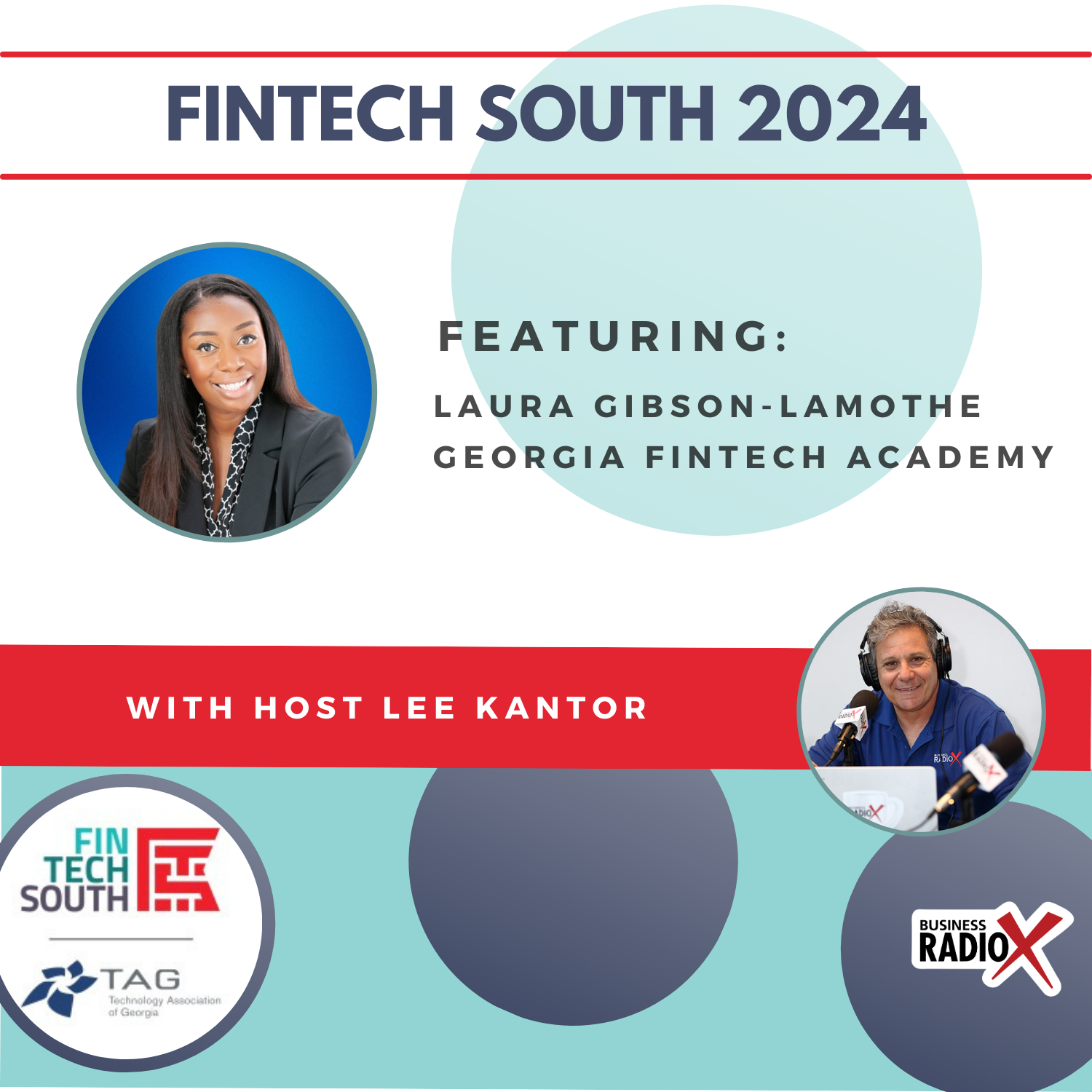

Fintech South 2024, hosted by the Technology Association of Georgia (TAG), took place on Aug. 27-28 at the Woodruff Arts Center and Atlanta Symphony Hall. This year’s theme was “Fintech Lives Here!”
 As the Executive Director of the Georgia Fintech Academy, Laura Gibson-Lamothe’s primary objective is to drive meaningful impact within the industry through the implementation of a comprehensive diverse talent development program.
As the Executive Director of the Georgia Fintech Academy, Laura Gibson-Lamothe’s primary objective is to drive meaningful impact within the industry through the implementation of a comprehensive diverse talent development program.
The Georgia Fintech Academy focuses on educating and empowering the next generation of fintech professionals by fostering collaboration with 26 institutions aligned with the University System of Georgia, as well as private universities and HBCUs. Our commitment extends to creating academic pathways to fintech at the secondary level, strategically cultivating a reservoir of talented individuals poised to shape the future of the industry.
Connect with Laura on LinkedIn.
![]() This transcript is machine transcribed by Sonix.
This transcript is machine transcribed by Sonix.
TRANSCRIPT
Intro: Broadcasting live from the Business RadioX studio in Atlanta, Georgia. It’s time for Atlanta Business Radio, brought to you by Kennesaw State University’s Executive MBA program, the accelerated degree program for working professionals looking to advance their career and enhance their leadership skills. And now, here’s your host.
Lee Kantor: Lee Kantor here, broadcasting live from the Woodruff Arts Center for Fintech South. One more time. This is the seventh year, I think, that we’ve been here broadcasting, and I’m so excited to be talking to our next guest, Laura Gibson-Lamothe. And she is the executive director with Georgia Fintech Academy. Welcome.
Laura Gibson-Lamothe: Thank you.
Lee Kantor: Well, I’m so excited to learn what you’re up to. Tell us about Georgia Fintech Academy. How are you serving folks?
Laura Gibson-Lamothe: Yeah, the Georgia Fintech Academy has been around since 2019. We are a academic talent development initiative within the state of Georgia. We support all 26 of the universities and colleges that exist underneath the university system of Georgia, and we provide a curriculum, a fintech curriculum. We also provide experiential learning opportunities, career development services. We do a podcast that’s co-hosted with students, and we pull students in from across the entire state. There’s currently 350,000 students enrolled across the state of Georgia, and 8000 of them we have reached with our fintech curriculum, which is pretty amazing.
Lee Kantor: Now, how did the kind of this idea. What was the genesis of the idea? Like who raised their hand and said, you know what, there should be a fintech academy. You know, that seems very niche. Yes.
Laura Gibson-Lamothe: Back in 2019, it was a combination of industry and academics in the room. The idea stemmed from the fact that Atlanta is and has become a major fintech hub recognized globally for the fintechs that we have in this space. And given the rapid growth economically here in the state of Georgia, the focus has also been on workforce development to support that, that growing demand.
Lee Kantor: So how how does it work? You have your own curriculum teaching fintech kind of skills that young people can get involved with and then learn. Or is it something where you’re partnering with the different education places to build a curriculum so that you’re always kind of teaching them the right things at the right time?
Laura Gibson-Lamothe: Yeah, that’s a good question. I like to I think I coined the term curriculum as a service. If not, I’m going to trademark that eventually in the future. That’s a.
Lee Kantor: Good one. Yes.
Laura Gibson-Lamothe: So what we do is we offer a core set of courses, and over the years that that core has grown. But we enable each university to offer a fintech degree of study. And so we have a variety of those 26 institutions that are on board with the curriculum. And they’ve built their own packages per se. Kennesaw state’s actually one that I would love to reference is an example of evolution of that curriculum. They first onboarded with just the core, so they were offering certificate in Fintech, but now they offer a master’s in digital financial technology, which all is supported through the accreditation process and the curriculum oversight by way of the Fintech Academy.
Lee Kantor: So it’s evolved from a certification to an actual degree. Yes, exactly. Wow. That’s I mean, is that unique in the country? It is.
Laura Gibson-Lamothe: Very unique. And I think from a fintech perspective, if you look at the the market for other universities offering this type of curriculum, it’s still, you know, early days. And so that’s actually drawn some appeal outside of the state of Georgia, you know, for other universities and organizations to to look at what successes we’ve had from a fintech curriculum development perspective.
Lee Kantor: So why is this event, Fintech South important to you in the organization? Yeah, it’s extremely important.
Laura Gibson-Lamothe: I feel like one of the things that we do really well is compliment the the in the classroom education with actual real world experiences. And there is none better than coming to an event hearing in real life. Um, experienced leaders talk about relevant themes and topics, uh, applied to the industry, and then also providing them a one stop access to a very broad network. Um, and today we have 35 students and a few faculty that are joining us from six different universities that we support, uh, Kennesaw State, University of Georgia, Georgia State University, Mercer, Morehouse. I think I covered them all. Oh, middle Georgia, um, University as well. Um, and those students have taken this opportunity by storm. Um, there’s there’s some, you know, institutions that are a little bit further out. So they have kind of band together to, to stay here locally for this event overnight. And they woke up extremely early this morning to make sure they’re connecting with people via the app and other channels so they can schedule in-person meetings at this event.
Lee Kantor: Now, is there any story you can share of a student that’s gone through the program and then was able to take their kind of career to a new level?
Laura Gibson-Lamothe: Yeah, one that I’m really proud about. Astrid, who is a graduate at Kennesaw State University. She is at Truist, and today she is at the Truist Booth in the Expo Hall. And I’ve had students full circle, full circle moment. Right. And I had students approach me and they were so excited. They were like, oh, she’s on the other side. Like she made it on the other side. And I’m like, wow, it’s funny to. And I’ve only been in this role for two years and I’ve already seen that, that cycle, um, uh, across the university system where there’s examples of that. But it’s really fulfilling to see these students look up to other students who have just more recently, you know, made it through, and then they’re now leading the way for the next generation of students coming through as well. So it’s kind of that reciprocated type of perspective for the both of them, thinking about what challenges that that younger student had to navigate to to get, you know, find their way through the industry and then those who have made it, I call them near peers to be able to be mentors for that next generation right there.
Lee Kantor: Showing them what’s possible. Yeah. So what do you need more of? How can we help?
Laura Gibson-Lamothe: Oh, I need everything. So all the things that I kind of outlined need support. So whether it be curriculum, we are constantly looking at evolving the curriculum. And the industry is evolving so fast. So for me coming to these events, I love hearing about some of the emerging trends and some new technology capabilities. And you guys know like AI is a hot topic. And so we’ve been really focused on generative generative AI and incorporating some of that in the curriculum because we’ve been so data science, um, AI and machine learning focused. But that’s just an example of like some of the aspects of the curriculum where we’re really looking to plug into industry to make sure that the training that we’re providing in the classroom is as relevant and current state as possible. The other side is, you know, the services that we offer for students. So we’re always looking for mentors and advisors. We have a mentorship program where we we sync based on background and an area of study for a student or, you know, an interest of a student with some mentors from the industry. And so the mentorship piece is really key for us. We do a speaker series, so twice a week, Monday and Wednesdays. Every night during each semester, we host an event, um, which is virtual because we want to provide accessibility across the university system, across the state of Georgia, where we have industry leaders come in and speak on certain themes and topics. And that one’s really cool because we get a lot of variety of the type of leaders that are willing to dedicate their time to just speak about various topics. And so we’re looking for those types of support mechanisms from the industry.
Lee Kantor: So how does somebody connect with the Academy?
Laura Gibson-Lamothe: Yes. So on our website Georgia Fintech Academy. Org forward slash volunteer. We actually have a volunteer form, which I’m really excited about, because that volunteer form kind of leads into I built like a CRM. I’m a techie in my background and my nature, so I love having solutions that really optimize process. Um, and so this volunteer form is really important because it’s a database that our faculty, we have 20 faculty across the university system teaching these courses. They’re working so close with the students, they need all the support they can get. And so we provide them access to that database for, um, you know, the repository of folks that have volunteered. And so we’re now leveraging that as a resource. And then also at the mothership, the Fintech Academy, we’re using that data as well. Um, and so I would recommend folks to, to sign up out there.
Lee Kantor: Well, thank you so much for sharing your story. You’re doing such important work and we appreciate you.
Laura Gibson-Lamothe: Thank you so.
Lee Kantor: Much. All right. This is Lee Kantor will be back in a few. At Fintech South.














